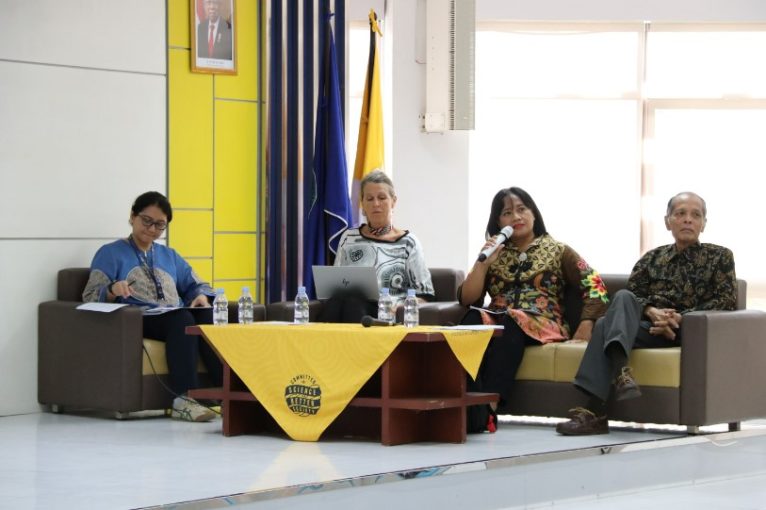
Yogyakarta, July 6th 2023─Gender representation in this era is one of the topics that is widely discussed by experts. Gender is no longer positioned as equality in the same sense, or equality, but is equalized based on the rights, obligations, and needs of each gender. The discussion of “Australia-Indonesia in Conversation: Valuing Democracy and Diversity: Equity, Leadership, and Social Justice” was entitled “Improving Gender Equity” on Thursday (6/7) discussed the meaning of gender and how the current environment is inclusive of this discourse.
“When we talk about gender violence, two things cannot be separated, namely youth and masculinity. There are no studies that say that men are the source of violence, but studies see that 95% of conflicts are constructed from masculinity inherent in men,” said Prof. Dr. Wening Udasmoro, S.S., M. Hum., DEA. Over the years the environment has shaped the stereotypes of violence, war, aggression, and power, as symbols of men and masculinity.
According to a study conducted by Wening on the Ambon Conflict, the younger generation has a big role in campaigning for peace and non-violence in ethnic-religious conflicts in Ambon. These efforts have been carried out since Ambon City was patented as World Music City in 2019. Messages of peace are often played along Ambon streets as a preventive measure for the Ambon conflict to recur.
In line with Wening’s opinion, Poso women’s activist and founder of the Women’s School, Lian Gogali also stated that one of the strategies for recovering from the post-conflict situation is through strengthening education, especially for women. The women’s group is an element that is closest to the family. Women play the role of home, manage the household, educate children, and not infrequently women are the backbone of the family. “If this education can be given to all women, then she will not only make changes in her family but also in the community, even in the world,” said Lian.
Efforts to overcome conflict through the development of gender equity are also carried out by Australia. Madeline Moss, Ministerial Counselor from the Australian Embassy revealed how the government is trying to overcome the rampant domestic violence conflicts. “Talking about conflicts involving gender, we found various cases of domestic violence. What’s worse, most conflicts don’t happen in a short time, and most laws are enforced against the victim. So we made a special law to deal with cases of domestic violence, in which victims get a guarantee not to be burdened for the suffering they experience,” said Madeline.
The Royal Commission, an independent legal institution for the Australian government, has discussed the issue of domestic violence in greater depth. The urgency that was conveyed was that most victims did not realize that they were experiencing violence. This of course can create an unhealthy environment for family members, even the community. Therefore, the Royal Commission urges the government to make policies related to handling domestic violence.
Indonesia itself is considered unable to provide legal certainty to victims of violence, especially domestic and sexual violence. This phenomenon is agreed upon by the female Muslim activist, Kalis Mardiasih. “There are many challenges faced in fighting for sexual violence in Indonesia. This relates to conservative religious groups that place men as breadwinners and women as caretakers of the household. It is this group that refuses to ratify the regulation on sexual violence,” said Kalis. For her, the struggle for gender equality in Indonesia is still far from over. Of course, the younger generation is expected to be more active in voicing forms of justice and equality for all genders.
